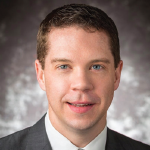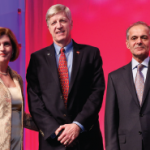Improving Access
In a state with just under 2 million residents and 664,300 living in rural areas, Dr. Snow says access to rheumatology care is a big issue in the state. A UNMC report found that 13 of Nebraska’s 93 counties have no primary care doctor, much less access to specialty care, such as rheumatology.1

Dr. Snow
“In my clinic, I’ve had patients who have made a three-hour drive for an appointment,” Dr. Snow says. “Wait times for a rheumatology appointment can often be several months in Omaha, and while this is a national issue as well, our association has been looking at ways to improve care to patients who live in rural areas.”
Dr. Snow and his colleague, Alan Erickson, MD, a rheumatologist at UNMC, both conduct rheumatology outreach clinics twice a month in two of the state’s rural areas. Dr. Erickson conducts clinics in West Point and Fall City, while Dr. Snow offers an outreach clinic in Columbus. Both rheumatologists have also offered educational programs in the outreach communities.
Two rheumatologists at the Creighton School of Medicine, Omaha, also provide outreach clinics.
“We’re striving to provide accessible care to patients in areas where they live and work,” Dr. Snow says.
The NRS was launched in 2017, after Dr. Snow learned a bill to legislate biosimilars was up for debate in his state.
Preparing for the Future
In addition to access, Dr. Snow says the Nebraska Rheumatology Society is also looking at how the projected rheumatologist shortage will impact the state and how physicians can work together to encourage resident involvement.
According to a 2019 Nebraska Department of Health and Human Services, State Unit on Aging report, the demographics of Nebraska are changing.2 By 2035, the state’s 60 and older population will increase by 36%.
This coincides with the Centers for Disease Control and Prevention’s (CDC) projection that the number of Americans with rheumatic diseases is on the rise, with 78 million adults being diagnosed with rheumatic diseases by the year 2040.3
“We’re looking at how we can highlight rheumatology as a career path before medical students narrow their focus to other specialties,” Dr. Snow says.
In addition, Dr. Elliott says the NRS hopes to include advanced practice providers, including physician assistants and nurse practitioners, in their outreach efforts.
“We’re fortunate to have two excellent medical schools in our state that are continuing to expose medical students and residents to careers in rheumatology,” Dr. Elliott says. “Additionally, the NRS and others are working with advanced practice provider programs to give rheumatology lectures and encourage their students to do clinical rotations.”

